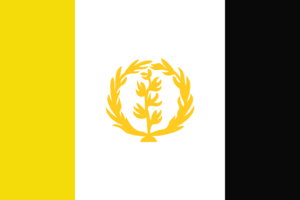Melvenia
Kingdom of Melvenia Korolevst das Melvenjya (Melvenian) | |
|---|---|
|
Flag | |
| Motto: Ob yenidem koro "United by the King" | |
| Anthem: "Oh Ivand, the King" | |
| Capital and largest city | Macrovik |
| Official languages | Melvenian |
| Recognised national languages | Melvenian |
| Ethnic groups (2023) | White (86%) Mixed (6%) Black (2%) Other (6%) |
| Demonym(s) | Melvenian |
| Government | Unitary semi-presidentialist constitutional monarchy |
• His Majesty the King of Melvenia | Sergui Zarev |
• President | Artem Stepanov |
• Prime Minister | Ivan Sokorin |
| Legislature | Duma |
| House of Lords | |
| House of Commons | |
| Establishment | |
• United Counties of Trimekev | 25 AD |
• Grand Duchy of Melvenia | 978 AD |
• Feudal Union of Trimkovs | 1245 AD |
• Absolute Kingdom of Melvenia | May 5th, 1492 |
• First Civil War | June 3rd, 1789 |
• United States of Melvenia | May 13th, 1795 |
• Second Civil War | July 1st, 1842 |
• Absolute Czardom of Melvenia | March 1st, 1850 |
• Kingdom of Melvenia | December 25th, 1934 |
• Current Constitution | November 1st, 1936 |
| Population | |
• 2023 estimate | 60,242,102 |
• 2023 census | 60,242,102 |
| GDP (PPP) | 2023 estimate |
• Total | ACU 4.4T (not ranked) |
• Per capita | ACU 73,047 |
| GDP (nominal) | 2023 estimate |
• Total | ACU 3.94T (not ranked) |
• Per capita | ACU 65,308 (not ranked) |
| Gini (2023) | high |
| HDI (2023) | very high |
| Currency | Melvenian Ruble (M₽) |
| Time zone | UTC 0 |
| Date format | dd-mm-yyyy |
| Driving side | right |
| Calling code | +414 |
| ISO 3166 code | ME |
| Internet TLD | .me |
Etymology
History
Geography
Demographics
Government
The Kingdom of Melvenia is a monarchy governed by a unitary, representative, and constitutional model according to the 1936 constitution. The constitution establishes three levels of government: the central government, provincial governments, and municipal governments. According to the constitution, the provinces are responsible for enforcing national laws within their territories, collecting taxes to send to the central government, and having certain competencies over health and education. Every six years, each province elects its governor and the members of the Provincial Assemblies through universal suffrage using a "first past the post" system with an electoral college. On the other hand, the municipalities are responsible for implementing local policies, and their representatives are also elected democratically. They are in charge of collecting taxes and then sending them to the provincial government.
The legislative power in the country is represented by the Duma, composed of the House of Commons (lower chamber) and the House of Lords (upper chamber). The Duma is responsible for creating and voting on new laws, approving the annual national budgets, and having the power to remove the Prime Minister. The House of Commons has representatives who are elected every four years by all citizens over the age of 18. There are a total of 501 electoral districts, each represented by one representative. The candidate with the most votes in each district wins the seat, while the others are eliminated. The representatives vote for the President of the Government, who must secure at least 251 votes to be elected. The President, after being appointed, designates the Prime Minister.
The House of Lords' representatives are also elected every four years, concurrently with the House of Commons. The House of Lords can reject proposals from the House of Commons once, sending them back for a second vote. If the proposal is approved again, the House of Lords must pass it. Each province elects 12 representatives regardless of population. The voting system used is Limited Voting.
Economy
